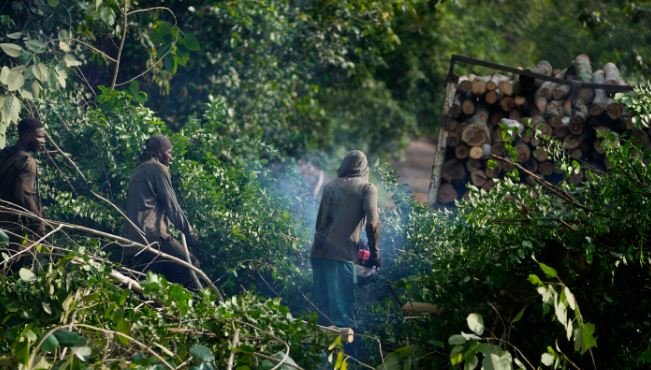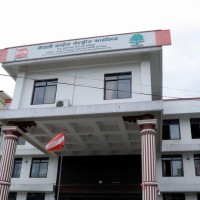- Saturday, 28 February 2026
Logging growing in Nigerian forest due to lax enforcement
Omo Forest Reserve, Nigeria, Aug. 31: Roaring chainsaws sent trees crashing to the ground, and bare-chested men hacked away at the branches beside a muddy road. Others heaved logs onto a truck, where they were tied in place with wire.
The work was similar on the other side of the road, with a timber-laden truck coughing dark plumes of smoke as it pulled away. This was miles into the conservation zone of Omo Forest Reserve in southern Nigeria, a protected area where logging is prohibited because it's home to threatened species like African elephants, pangolins and white-throated monkeys. But forest rangers, seeing the impunity, were hesitant to act.
“We see people we arrested and turned over to the government back in the forest, and they get emboldened,” ranger Sunday Abiodun told The Associated Press during a recent trip to the reserve.
Conservationists say the outer region of Omo Forest Reserve, where logging is allowed, is already heavily deforested. As trees become scarce, loggers are heading deep into the 550-square-kilometer conservation area, which is also under threat from uncontrolled cocoa farming and poaching.
Conservationists and rangers blame the government for not enforcing environmental regulations or adequately replanting trees, impeding Nigeria’s pledge under the Paris climate agreement to maintain places like forests that absorb carbon from the atmosphere.
The government of Nigeria's southwestern Ogun state, which owns the reserve, denied failing to enforce regulations. In a statement, it said it's replanting more trees than are being cut down.
The forest's gatekeepers and those processing the wood both dispute that assertion, insisting trees are disappearing.
Sawmillers get annual permits from the government to cut down trees until their designated area is completely deforested. Then they can apply for a new section. They say the permit fee of 2 million naira ($2,645) is intended to cover the government’s costs to replace trees but that this rarely occurs.
“The government is not replanting,” said Owolabi Oguntimehin, a sawmiller in Ijebu, a nearby town that has over 50 sawmilling companies relying on the reserve. “It is not our responsibility to replant because the government collects the fee from us.”
Besides problems with replanting, authorities don't enforce tree removal standards, even when loggers get permits, according to forest guards, who are employed by the state government.
Joseph Olaonipekun, a guard, said officials from Ogun state's forestry department used to mark trees that could be cut and ensure “strict” enforcement to prevent others from being removed. But that's no longer done, he said.
“By implementing selective logging, the adverse effects on the biodiversity of an area can be minimized while also providing the opportunity for young trees to continue growing,” Nigerian ecologist Babajide Agboola said. “This method allows for a more sustainable approach to logging and forest management.” (AP)









-original-thumb.jpg)







